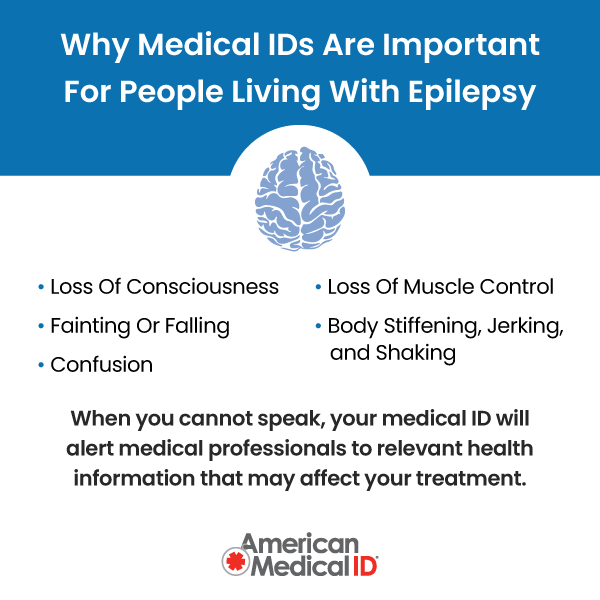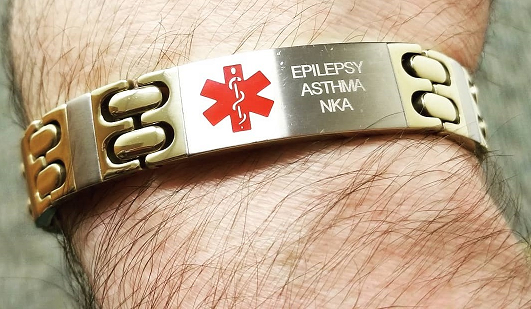

Medical IDs for Epilepsy
Epilepsy is a serious neurological disorder that affect 1.2% of the total US populations. According to CDC, there are about 3.4 million people with epilepsy nationwide. 3 million of these are adults and 470,000 are children. It is important to know that anyone can develop epilepsy regardless of gender, ethnic background, or age.
“Persons with epilepsy should wear medical alert jewelry (for example, a medical ID bracelet) so that prompt medical treatment can be obtained if a seizure occurs.” – Houston Methodist
Why medical ID bracelets are important for people living with epilepsy


Seizures can happen at any point in time. If one does occur, first responders are immediately aware of what medications you are taking, so a mistake is not made. Houston Methodist Hospital says that
“Persons with epilepsy should wear medical alert jewelry (for example, a medical ID bracelet) so that prompt medical treatment can be obtained if a seizure occurs.”
The main symptom of epilepsy is repeated seizures that are caused by abnormal brain activity. Seizures can happen any time and cause a person to experience the following:
- loss of consciousness
- fainting or falling
- body stiffening, jerking, and shaking
- loss of muscle control
- confusion
Should a person with epilepsy wear a medical alert bracelet?
It is recommended to wear a medical alert bracelet for epilepsy. When you cannot speak, your medical ID will alert medical professionals to relevant health information that may affect your treatment.
Communicating Epilepsy in an Emergency
Seizures do not usually require emergency medical attention especially if a person is diagnosed with epilepsy. Wearing a medical ID is a simple and effective way to communicate epilepsy, even when the person becomes unconscious or unable to speak. Having a medical alert bracelet or necklace can help avoid unnecessary emergency room visits after a seizure has occurred.
Not wearing a medical ID prevents others from knowing whether the seizure is caused by epilepsy or if a person has other medical conditions. This is important for people to know whether they should call an ambulance or not, especially if a seizure only lasts under five minutes.
“Because a seizure can strike at any time, do your best to be prepared. If you have uncontrolled seizures, don’t drive to reduce your risk of being in an accident. Ask your doctor about wearing a medical alert bracelet that identifies you as having epilepsy so that people will know what to do if you have a seizure. “ – Columbia University Department of Neurology
What to Engrave on an Epilepsy Medical ID
Epilepsy is a serious medical condition that emergency and health professionals should be alerted of. Every person's medical conditions are different hence, it is recommended to choose a personalized medical alert jewelry that can hold unique and specific medical information about their epilepsy. This can include the following:


Photo credit: Epilepsy Empowered
- Your Full Name to identify yourself and give responders a way to address you
- Your Epilepsy Condition and if you have other medical conditions or Allergies (food or medication)
- Your Epilepsy Medications such as anticonvulsant/anti-seizure
- In Case of Emergency Contact
Tips for purchasing a medical ID bracelet or medical ID necklace for people with epilepsy
There are a few things to keep in mind when purchasing medical alert jewelry. It's important to make sure that the jewelry is comfortable to wear and not too bulky. It should also be durable, as it will need to withstand daily wear.
The information on the ID should be easy to read and understand. It is also important to make sure that the information is up-to-date and accurate. Here are a few additional tips when buying a medical ID:
- Your ID should also be made from durable materials. American Medical ID offers many types of IDs made from Stainless Steel, Sterling Silver, Gold-Filled, Rose Gold, along with 10k and 14k Gold. All our medical IDs are assembled in the USA and we offer optional 2-year or lifetime warranties
- Consider how often you’ll need to update your information. If you have a phone number change, are changing your ICE (In Case of Emergency) contact information, or develop a new medical condition, you’ll want to make sure that's always updated. If you find yourself constantly updating your information, consider using our service MyIHR (My Interactive Health Record) where you can store and keep up-to-date on your medical records. Remember to review your ID regularly to be sure it still fits and the information is correct. When an emergency arises, every second counts.
- Finally, the engraving should be clear and easy to read. We recommend utilizing commonly recognized abbreviations if you need to save space on your engraving. This will make it easier for EMTs and first responders to quickly identify your medical conditions.
When looking for a bracelet, it is important to keep these things in mind. By doing so, you can be sure that you are purchasing a piece of jewelry that will be both comfortable and lifesaving in emergencies.


“I would love to see people with epilepsy living their lives, not feeling held back by their condition. But that means we’re likely to be around people who don’t know we have epilepsy, and don’t know what to do if we have a seizure. Wearing a medical ID can help us deal with that by letting people know about our conditions. The ID can speak for us when we can’t. Getting one gives you peace of mind, and helps those around you help when you need it. If you have seizures fairly often, and put yourself out there among people who don’t know about your epilepsy, you should strongly consider getting one. – Matt Gutting, Epilepsy Empowered

 - UK
- UK  - Canada
- Canada  - Australia
- Australia 
